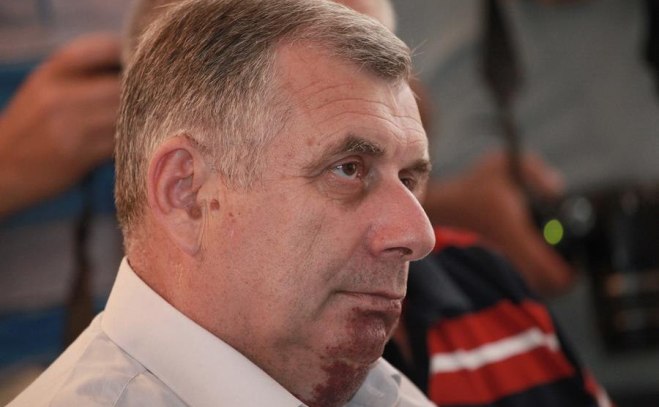Stanislav Lakoba loses Security Council Secretariat over passport policy — again

Taklama -- In the ongoing row over whether local authorities in Abkhazia’s Gali, Ochamchira and Tquarchal Districts have been handing out passports to Georgian residents too liberally, Stanislav Lakoba has been fired as Secretary of the Security Council on 28 October. His replacement is veteran politician Nugzar Ashuba, who was Speaker of Parliament before suffering a second-round defeat in the 2012 elections.
There is a considerable sense of déjà vu here, since Lakoba already once himself stepped down from the same position over the same issue — in 2008, during the presidency of Sergei Bagapsh. He was reappointed in 2011 after Bagapsh had passed away and was succeeded by Alexander Ankvab (previously Vice President). This time, the falling out has been much more acrimonious. After his dismissal, Lakoba gave a press conference accompanied by opposition MP Aslan Kobakhia, in which he explained his position and leveled accusation at the current government and President Ankvab in particular. This in turn prompted a public response by Prime Minister Leonid Lakerbaia, a long term ally of Ankvab.
During the press conference, Lakoba stressed that he had no personal disagreement with President Ankvab. He also denied that his confrontational stance was inspired by any presidential ambitions of his own, citing his old age and hinting at his lack of proficiency in Abkhaz, which makes him ineligible. Lakerbaia for his part dwelt for some time on his long cooperation with Lakoba, both in opposition and in government.
The discord boils down to three points. Firstly Lakoba and Lakerbaia disagreed over what was and what was not said during Security Council Meetings. These claims are difficult to evaluate and are ultimately not very significant — whether the other Security Council Members agreed with Lakoba’s position, whether the President unlawfully invited non-members to attend meetings and whether the President failed to convene the Security Council when Russian diplomat Dmitri Vishernev and his wife were murdered, or whether it would have been Lakoba’s responsibility to take the initiative.
Secondly, Lakoba agrees with the opposition that the unlawfully issued passports to Georgians constitute a big problem and that not enough is being done to rectify it and to punish the officials responsible, even going so far as to warn that unless reversed, the current policy will result in the annexation of Abkhazia by Georgia. Lakerbaia for his part repeatedly voiced the official government position that individual cases of abuse must be dealt with.
But the most fundamental disagreement is over the position of Georgians in Abkhazia’s society. Lakoba argued that some Abkhazian passports have been obtained by Georgians not even resident in Abkhazia and by those who fought against Abkhazia in the past, while other Georgians who attended the University of Sukhum and who joined the Abkhazian army have gone without. And moreover, that the government has failed to introduce a system of resident permits for those Georgians that do not qualify for citizenship. Lakerbaia concentrated on this latter point, claiming that Lakoba had during the Security Council meeting of 30 April presented resident permits as a general solution for all Georgians, and had even suggested that those unwilling to submit to Abkhazian institutions should leave Abkhazia. In Lakerbaia’s words, on that day “his friendship with Lakoba ended”.
Lakoba is right to point out that Abkhazia should have a system of resident permits for non-citizens, and the Baltic countries have already demonstrated the practice of issuing resident permits to a large part of society. However, the Baltic approach is perhaps not to be emulated, and invalidating passports on a large scale would be unjust in itself and prove absolutely detrimental for Abkhazia’s prospects to integrate its Georgian residents. Most importantly, Lakerbaia convinces when he makes the plea that Abkhazia should embrace its Georgian residents, for this is not a populist position. By firing Lakoba, the Abkhazian government has — at least for the moment — chosen not to give in to nationalist pressure and to stay a moderate course.
First published on Taklama